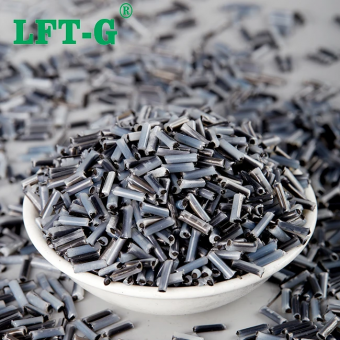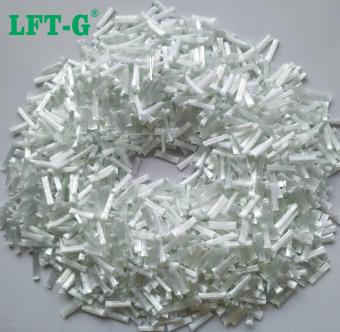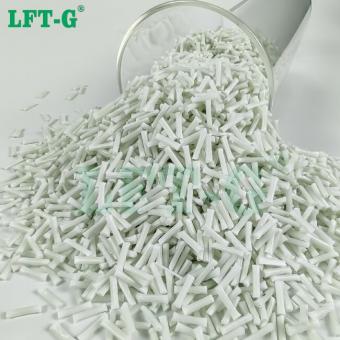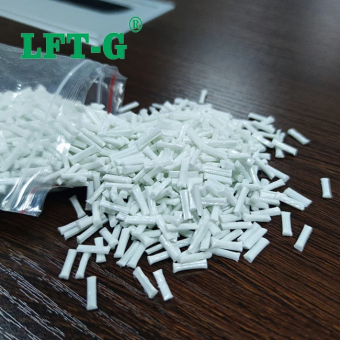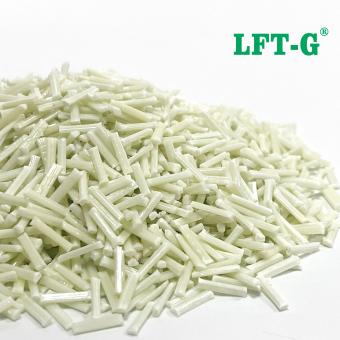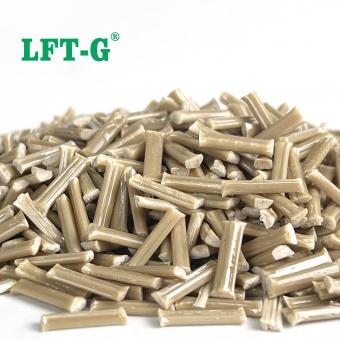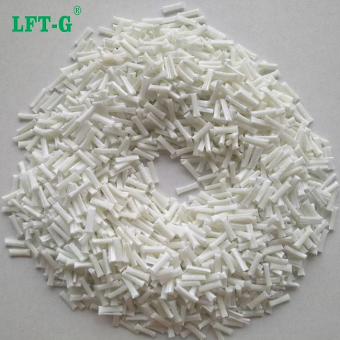-
Xiamen LFT Thermoplastic Polyurethane (TPU) Long Glass Fiber Reinforced Thermoplastic CompoundsThermoplastic Polyurethane is soft and elastic, with excellent tensile and tear strength. For this reason, it is often used to make parts that demand a rubber-like elasticity. TPU is a little bit expensive than other resins, but there is no substitute for many applications, such as protective wire and cable sheaths. Another advantage is that TPU improves the grip for products that need to be held securely in hand. About TPU-LGF compounds What Products Are Best Manufactured via Thermoplastic Polyurethane (TPU)? Some of the TPU products manufactured are automotive instrument panels, caster wheels, sporting goods, power tools, drive belts, medical devices, footwear and etc. What is Thermoplastic Polyurethane (TPU) for Plastic Injection Molding? ETPU is a tough, highly abrasion-resistant resin that bridges the gap between rubbers and plastics. TPUs can be formulated to be rigid or elastomeric. TPU exhibits a high flex before break and is ideal for wheels and door panels. What is the Molding Temperature for Thermoplastic Polyurethane (TPU)? depending on the TPU being molded. Materials Details Number TPU-NA-LGF Color Natural color or Customized Length 6-25 mm Package 25kg/bag MOQ 25kg Lead time 2-15 days Port of Loading Xiamen Port Trade terms EXW/FOB/CFR/CIF/DDU/DDP About Xiamen LFT Xiamen LFT Composite Plastic Co.,LTD was established in 2009, is a brand-name global suppliers of long fiber reinforced thermoplastic materials integrating product research & developmen (R&D), production and sale marketing. Our LFT products have passed the ISO9001&16949 system certification and have obtained lots of national trademarks and patents, covering the fields of automotive, military parts and firearms, aerospace, new energy, medical equipment, power wind energy, sports equipment, etc. LFT long fiber reinforced thermoplastic engineering materials,compared to ordinary short fiber reinforced thermoplastic materials (fiber length is less than 1-2 mm), the LFT process produces thermoplastic engineering material's fibers in lengths of 5-25 mm. The long fibers are impregnated with the resin through a special mold system to obtain long strips that are fully impregnated with the resin ,and then cut to the length as required. The most used base resin is PP, by PA6, PA66, PPA,PA12,MXD6,PBT,TPU,PPS, ABS,PEEK, etc. Conventional fibers include glass fiber, carbon fiber. Depending on the end use, the finished products can be used for injection molding,extrusion, molding, etc., or directly used for plastic instead of steel and thermoset products.
- High performance thermoplastic engineering plastics
- excellent heat resistance with filler
- injection molding products light weight
- excellent tensile and tear strength
- modified plastic manufacturer can be customized
- can be recylced GFRP GF30
Tags :
-
Xiamen LFT high performance Polyphenylene Sulfide Long Glass Fiber Reinforced Thermoplastic PolymersPPS is a high-performance, tough engineering plastic with great dimensional and thermal stability, as well as a wide operating temperature range of up to 260 °C and good chemical resistance. Moreover, PPS, like most other thermoplastics, is an electrical insulator. Its ability to be used at high temperatures coupled with its thermal stability makes PPS great for applications such as semiconductor components in machinery, bearings, and valve seats. About PPS-LGF compounds PPS plastic (polyphenylene sulfide), English name: Polyphenylenesulfide, is a thermoplastic special engineering plastic with excellent comprehensive properties. Its outstanding features are high temperature resistance, corrosion resistance and superior mechanical properties. The product will make a metallic sound when it is dropped to the ground. . Pure PPS is rarely used alone due to its brittle performance. Most of the PPS used is its modified variety. Glass fiber reinforced PPS is one of them. PPS lengthened glass fiber (LGF) composite material has the advantages of high toughness, low warpage, fatigue resistance, and good product appearance. It can be used in water heater impellers, pump casings, joints, valves, chemical pump impellers and casings, cooling water impellers and Shells, home appliance parts, etc. Automotive industry Applications: Due to its excellent mechanical properties, thermoplastic carbon fiber is widely used in the automotive field of fuel system components, sensors, shell components. On the one hand, it is because of the high strength and stiffness of PPS-LCF, and the finished parts are not easy to damage. On the other hand, PPS-LCF also has a relatively low coefficient of thermal expansion to ensure the stability of the finished product. In addition, PPS-LCF also has very good corrosion and heat resistance, making the application life of the finished product longer. Industrial Applications: In the industrial field, it is mainly used in the parts of equipment, such as chemical processing equipment, air pumps, gaskets, valves, etc. In addition to the high strength of the PS-LCF, it is also because the parts made by the PS-LCF have very good self-lubricating properties, which is very important for mechanical parts. Therefore, compared with the traditional carbon fiber material products, the performance has been greatly improved. The wide range of applications of PPS-LCF include aerospace, automotive manufacturing, electronic equipment, chemical and medical fields. Basic Performance of PPS-LGF 1 Excellent overall performance. PPS resin is a crystalline polymer with high hardness. Its crystal content is about 65% and its density is 1.34g/cm^3. It has excellent mechanical properties. Its tensile strength and bending strength are better than those of PA, PC, PBT, etc. It has extremely high rigidity and creep resistance. The mechanical properties will better after adding glass fiber reinforcement. 2 Excellent heat resistance. Its melting point can reach 275~291℃, and its heat distortion temperature is 135℃. After glass fiber reinforcement, its heat distortion temperature can reach 260℃. In air, polyphenylene sulfide reaches the weakening temperature at about 400°C, and polyphenylene sulfide begins to decompose in air at 700°C. The long-term use temperature is 200~240℃, and the thermal stability of long-term continuous use is better than all current engineering plastics. 3 The dielectric strength is better. PPS has a symmetrical molecular structure, non-polarity, and low water absorption, so its electrical insulation is very good. Compared with other engineering plastics, its dielectric constant is small, and its arc resistance is equivalent to that of thermosetting plastics. It can be used in high temperature, high humidity, frequency conversion, etc. Under harsh conditions, PPS can still maintain excellent electrical insulation. 4 preservative. Because PPS has a high degree of crystallinity, it has excellent chemical resistance and is insoluble in any organic solvent below 200°C. In addition to strong oxidizing acids, it can withstand the erosion of various acids, alkalis, and salts. After being soaked in various chemicals for a long time, it still maintains high strength. Materials Details Number PPS-NA-LGF Color Natural color or Customized Length 6-25 mm Package 25kg/bag MOQ 25kg Lead time 2-15 days Port of Loading Xiamen Port Trade terms EXW/FOB/CFR/CIF/DDU/DDP About Xiamen LFT Xiamen LFT Composite Plastic Co.,LTD was established in 2009, is a brand-name global suppliers of long fiber reinforced thermoplastic materials integrating product research & developmen (R&D), production and sale marketing. Our LFT products have passed the ISO9001&16949 system certification and have obtained lots of national trademarks and patents, covering the fields of automotive, military parts and firearms, aerospace, new energy, medical equipment, power wind energy, sports equipment, etc. LFT long fiber reinforced th...view more
-
Xiamen LFT Nylon series Polyamide 66 Long Glass Fiber Reinforced Thermoplastic ResinPolyamide, which is also known by the trade name, Nylon, has excellent heat resistant properties, especially when combined with additives and filler materials. In addition to this, Nylon is very resistant to abrasion. Xiamen LFT offers a wide range of temperature-resistant nylons with many different filler materials. About PA66-LGF compounds Nylon 6,6, also written as nylon 6-6, nylon 66, or nylon 6/6, is a more crystalline version of nylon 6. It is also referred to as polyamide 66 or PA 66. It has improved mechanical properties due to its more ordered molecular structure. Nylon 66 for machining has improved temperature resistance and lower rates of water absorption when compared to standard nylon 6. The advantages of nylon 6,6 are that the yield strength is higher than nylon 6 and nylon 610. It has high strength, toughness, rigidity, and low coefficient of friction in a wide temperature range. In addition, it is oil resistant and resistant to chemical reagents and solvents. However, PA66 has strong hygroscopicity and poor dimensional stability, which limits its application. In order to obtain nylon 66 engineering material with higher strength, it should be modified by glass fiber reinforcement. The mechanical properties of long glass fiber reinforced nylon 66 (LGFR-PA66) are obviously better than those of short glass fiber reinforced nylon 66 (SGFR-PA66), and the molding processing performance is also better. It can be molded by various molding methods such as injection molding and compression molding, and complex components can also be formed. Therefore, long glass fiber reinforced nylon 66 can be widely used in building materials, aerospace, electronic devices, furniture and other fields, especially in the automotive industry application market. The production process of long glass fiber reinforced nylon 66 is different from that of short glass fiber reinforced nylon 66. The short glass fiber reinforced nylon 66 particle is chopped under the friction and shearing of screw and barrel, and the short glass fiber reinforced nylon 66 particle is obtained with the length of glass fiber monofilament about 0.5mm. The length of some glass fiber monofilament in the final product is lower than the critical length of reinforcement, and the glass fiber is easy to be extracted from the nylon 66 matrix when the product is stressed. The strength of glass fiber is not fully utilized, and the mechanical properties of the product are not high. Long glass fiber reinforced nylon 66 has better reinforcement effect and dimensional stability, and the rigidity, tensile, bending, impact resistance and fatigue resistance of the manufactured products are better, and the service life is longer. Materials Details Number PA66-NA-LGF Color Natural color or Customized Length 6-25 mm Package 25kg/bag MOQ 25kg Lead time 2-15 days Port of Loading Xiamen Port Trade terms EXW/FOB/CFR/CIF/DDU/DDP About Xiamen LFT Xiamen LFT Composite Plastic Co.,LTD was established in 2009, is a brand-name global suppliers of long fiber reinforced thermoplastic materials integrating product research & developmen (R&D), production and sale marketing. Our LFT products have passed the ISO9001&16949 system certification and have obtained lots of national trademarks and patents, covering the fields of automotive, military parts and firearms, aerospace, new energy, medical equipment, power wind energy, sports equipment, etc. LFT long fiber reinforced thermoplastic engineering materials,compared to ordinary short fiber reinforced thermoplastic materials (fiber length is less than 1-2 mm), the LFT process produces thermoplastic engineering material's fibers in lengths of 5-25 mm. The long fibers are impregnated with the resin through a special mold system to obtain long strips that are fully impregnated with the resin ,and then cut to the length as required. The most used base resin is PP, by PA6, PA66, PPA,PA12,MXD6,PBT,TPU,PPS, ABS,PEEK, etc. Conventional fibers include glass fiber, carbon fiber. Depending on the end use, the finished products can be used for injection molding,extrusion, molding, etc., or directly used for plastic instead of steel and thermoset products.view more
-
Xiamen LFT-G reinforced PBT plastic Long glass fiber polymers high qualityProduct grade: General grade Fiber specification: 20%-60% Product feature: High toughness, Low warpage Product application: Electronic appliances, Machinery parts etc.
- PBT resin high mechanical properties
- Electronic appliances composites
- sample available pbt
- Natural color widely applications
- Fiber filling material compounds
- High toughness industry use
Tags :
-
Xiamen LFT-G Polyphenyl sulfide fill Long Carbon Fiber Polymer PPSPolyphenylene sulfide is a new functional engineering plastic.
- Polyphenyl sulfide long carbon fibre
- PPS plastic rein forced compounds
- Composite material pps industrial use
- Filling lcf 30 pps composite plastic new materials
- High flame retardant car parts CFRP
- Factory use raw material modified plastic high performance
Tags :
-
LFT Polypropylene reinforced plastic long carbon fiber higher performance 12mm natural colorPP material PP is a polymer made of propylene as monomer by coordination polymerization, and is one of the five major general-purpose plastics PE, PP, PVC, PS and ABS. 1. colorless, tasteless, five toxic, unadded PP material compounded with FDA and other food-grade material requirements; 2. due to the crystalline nature of PP, the original color milky white translucent, better transparency than PE; 3. low specific gravity of 0.9, almost one of the lightest plastics than water; 4. good toughness, especially repeated resistance to bending ability, commonly known as 100 fold rubber; 5. better heat resistance than PE, which can reach up to 120°C; 6. good resistance to hydrolysis and can be sterilized by high temperature steam 7. good chemical resistance, especially acid resistance, can be due to the storage of concentrated sulfuric acid containers; 8. outdoor use is susceptible to light, ultraviolet light and other aging. Modified PP material PP material by filling carbon fiber can increase the rigidity and modulus of PP material, reduce the material deformation caused by shrinkage, but at the same time the material toughness decreases. By adding anti-UV agent, anti-aging agent can improve the outdoor use performance of PP, and adding flame retardant material can improve the flame retardant performance of PP. TDS for reference only SGF VS LGF Long carbon fiber specification Application Product processing We will offer you 1. LFT&LFRT material technical parameters and leading edge design 2. Mold front design and recommendations 3. Provide technical support such as injection molding and extrusion molding
- carbon fiber reinforced plastics granules
- long carbon fiber reinforced pp
- long fiber compounds pp
- long fiber composite PP granules
- long carbon fiber polypropylene
Tags :
-
Xiamen LFT Polyetheretherketone CF composite 20%-60% high performance natural colorProduct grade: General grade Fiber specification: 20%-60% Product feature: Flame resistant, Heat resistant, Chemical resistant, Low friction coefficient, Good load bearing Product application: Aviation, Machinery, Electronics, Chemicals, Automotive, Other high-tech fields.
- Good load bearing polyetheretherketone
- Low friction coefficient made bu own factory
- Own factory made pure and virgin peek
- Wide useage peek industrial materials reinforced peek
- Customized materials peek toughness Carbon
- Long Glass Fiber can be recycled peek aerospace
Tags :
-
Xiamen LFT PLA filling Long carbon fiber Reinforced polylactic acidPLA materials are current pioneering materials in biodegradable materials. Long carbon fiber Reinforced polylactic acid PLA modified materials are likely to become global advantages in future green materials.
- PLA long carbon fiber high rigidity and strength
- Reinforced polyactic pla instead metal
- PLA composite green materials
- long carbon fiber with PLA modification
- PolyacticDegradable material
Tags :
-
Xiamen LFT Polyamide12 filled Long Carbon Fiber composite lightweight sample availablePA12 information Long carbon chain nylon is a nylon with amide group in the main chain repeating unit of nylon molecule, and the length of methylene group between two amide groups is more than 10. We call it as long carbon chain nylon, including nylon 11, nylon 12, etc.. PA12 is nylon 12, also known as poly(dodecalactam) and poly(laurolactam), which is a kind of long carbon chain nylon. The basic raw material for polymerization is butadiene, a semi-crystalline - crystalline thermoplastic material. Nylon 12 is the most widely used long carbon chain nylon, it has most of the general properties of nylon, in addition to low water absorption, and has high dimensional stability, high temperature resistance, corrosion resistance, good toughness, easy processing and other advantages. Compared with PA11, another long carbon chain nylon material, PA12's raw material butadiene is only one-third the price of PA11's raw material castor oil, and can be used in most scenarios instead of PA11, and has wide applications in many fields such as automotive fuel hoses, air brake hoses, submarine cables, and 3D printing. Among long-chain nylon, PA12 has great advantages compared with other nylon materials, its advantages are the lowest water absorption, lowest density, low melting point, impact resistance, friction resistance, low temperature resistance, fuel resistance, good dimensional stability, good anti-noise effect, etc. PA12 has the properties of PA6, PA66 and polyolefin (PE, PP) at the same time, to achieve the combination of lightweight and physical and chemical properties, with performance It has the advantages of light weight and physical and chemical properties. PA12-LCF If the base material is compared to concrete, the fiber is like steel reinforcement, and mixing the two is like adding steel reinforcement to concrete. If there is only concrete, the castings will easily crack under external forces, but once the high-strength reinforcement is added to it and the concrete wraps it sufficiently, they will become a single unit. When the object is subjected to external forces, the rebar can withstand most of the external forces, making the structural strength of this whole very high. Carbon fiber has many excellent properties, high axial strength and modulus of carbon fiber, low density, high specific performance, no creep, resistance to ultra-high temperature in non-oxidizing environment, good fatigue resistance, specific heat and electrical conductivity between non-metal and metal, small coefficient of thermal expansion and anisotropy, good corrosion resistance, good X-ray transmittance. Good electrical and thermal conductivity, good electromagnetic shielding, etc. Compared with traditional glass fiber, carbon fiber has more than 3 times of Young's modulus; it is about 2 times of Young's modulus compared with Kevlar fiber, which is insoluble and swollen in organic solvents, acids and alkalis, and has outstanding corrosion resistance. Nylon itself is an engineering plastic with excellent performance, but moisture absorption, poor dimensional stability of products. Strength and hardness is also far from metal. In order to overcome these shortcomings, as early as before the 70s. People have used carbon fiber or other varieties of fibers for reinforcement to improve its performance. Carbon fiber reinforced nylon materials have developed rapidly in recent years, because nylon and carbon fiber are excellent performance in the field of engineering plastics materials, its compound material synthesis reflects the superiority of the two, such as strength and rigidity than unreinforced nylon is much higher, high temperature creep is small, thermal stability has improved significantly, good dimensional accuracy, wear resistance. Excellent damping, compared with glass fiber reinforced has better performance. Therefore, carbon fiber reinforced nylon (CF/PA) composites have developed rapidly in recent years. Datasheet for reference Nylon 12 has low water absorption, good low temperature resistance, good air tightness, excellent alkali and grease resistance, medium resistance to alcohols and inorganic dilute acids and aromatics, good mechanical and electrical properties, and is a self-extinguishing material. Application Suitable for the automotive, sports parts, solar energy, high-end toys and other industries. Other products you may wonder PP-LCF PA6-LCF PA66-LCF ...
- Nylon composite pellets Polymer granules
- Nylon polymer LCF manufacturer
- Modified materials Nylon PA12
- extrusion level Nylon modified
- pa lcf30 producer mess production good price
- carbone fiber reinforced pa12 pellets
Tags :
-
LFT Polyamide 66 high performance long carbon fiber reinforcementPolyamide 66 roving carbon fiber Nylon black color with heat resistance
- Long carbon fiber enhance pellets
- Roving carbon fiber PA66 instead metal and steel
- Nylon66 composite granules for injection
- High quality PA66 long fiber composite、
- Polyamide long fiber composite
- Virgin plastic PA6 LCF40 for car parts
Tags :
-
LFT Polyamide 66 high performance long carbon fiber reinforcementPolyamide 66 roving carbon fiber Nylon black color with heat resistanceview more

 e-mail
e-mail English
English français
français Deutsch
Deutsch русский
русский italiano
italiano español
español português
português العربية
العربية 日本語
日本語 한국의
한국의 中文
中文





